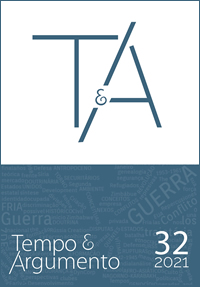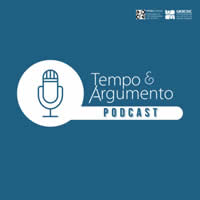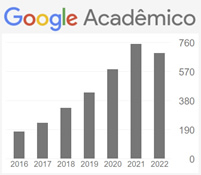A guerra de Nagorno-Karabakh: as disputas em torno dos conceitos de ‘vítima’ e ‘genocídio’ no tempo presente
DOI :
https://doi.org/10.5965/2175180313322021e0111Résumé
O presente artigo tem como finalidade analisar a noção de "vítima" e os usos do conceito de "genocídio" envolvendo armênios e azerbaijanos na guerra de Nagorno-Karabakh. O objetivo é compreender como ambos os povos mobilizam essas noções de forma a sustentar suas reivindicações políticas sobre o território em questão e deslegitimar as aspirações do outro. Nesse sentido, é crucial compreender os usos políticos dos massacres e genocídios na tentativa de angariar apoio internacional para suas causas. Para tanto, vamos analisar posicionamentos de lideranças armênias e azerbaijanas sobre o conflito descongelado em setembro de 2020
Téléchargements
Références
ANTARAMIÁN, Carlos. Abusing the term “Genocide” in distant domains: the statue of Aliyev and the Khojaly Massacre in two squares in Mexico City. Journal of the Society for Armenian Studies, Fresno, v. 22, p. 263-77, 2013.
APOSENTADO armênio. [Entrevista concedida a] Heitor Loureiro, Ivanyan (Nagorno-Karabakh), 3 maio 2015. (Arquivo pessoal).
ARMENIAN church makes saints of 1915 genocide victims. Deutsche Welle, Bonn, 23 Apr. 2015. Available in: https://www.dw.com/en/armenian-church-makes-saints-of-1915-genocide-victims/a-18405330. Access on: 22 Nov 2020.
ARMENIAN troops singing the famous Armenian war song "Gini Lits". Nagorno-Karabakh, 06 out. 2020. 1 vídeo (57 seg). Disponível em: https://youtu.be/Z8Bfry8CnLs. Acesso em: 21 abr. 2021.
AYDOGAN, Merve; ALIYEV, Jeyhun; BIR, Burak. Anadolu Agency, Ancara, 08 Nov. 2020. Available in: https://www.aa.com.tr/en/azerbaijan-front-line/shusha-city-freed-from-armenias-occupation-azerbaijan/2036192. Access on: 22 Nov. 2020.
AZERBAIJÃO. Joint press statements of Presidents of Azerbaijan and Turkey. Baku, 15 Sep 2010. Available in: https://en.president.az/articles/736/print. Access on: 21 Apr 2021.
AZERBAIJÃO. Ilham Aliyev addressed the nation. Baku, 10 Nov. 2020. Available in: https://en.president.az/articles/45924. Access on: 22 Nov. 2020.
BAJALAN, Djene, YILDIZ, Sara Nur; DAVIDIAN, Vazken Khatchig. O que de fato move o conflito entre Azerbaijão e Armênia. Jacobin Brasil, São Paulo, 17 out. 2020. Disponível em https://jacobin.com.br/2020/10/o-que-de-fato-move-o-conflito-entre-azerbaijao-e-armenia/. Acesso em: 17 nov. 2020.
BLOXHAM, Donald. The great game of genocide: imperialism, nationalism, and the destruction of the Ottoman Armenians. Nova York: Oxford University Press, 2005.
BOGOSIAN, Eric. Operation Nemesis: the assassination plot that avenged the Armenian Genocide. Nova York: Little Brown, 2015.
BOGOSSIAN-PORTO, Pedro. 'É o renascimento de uma identidade nacional!’: a relevância da guerra e do genocídio no nacionalismo armênio. Hades: Revista Interdisciplinar, Osasco, n. 1, p. 168-189, 2017.
BOGOSSIAN-PORTO, Pedro. Forget me not: the drama of building an identity on the centennial of genocide of the Armenians. Genocide Studies International 12, Toronto, n. 2, p. 191-207, 2018.
BOGOSSSIAN-PORTO, Pedro. Notas de campo. Yerevan: [s.n.], 2016.
CAUCASUS WATCH. Military exercises in the Caucasus: a war of nerves between Baku and Yerevan. [S.l.], 4 Aug. 2020. Available in: https://caucasuswatch.de/news/2935.html. Access on: 22 Nov. 2020.
CHORBAJIAN, Levon. Introduction. In: CHORBAJIAN, Levon. (org). The making of Nagorno-Karabagh: from secession to republic. New York: Palgrave Publishers, 2001. p. XI-XIII.
CONSTITUTION OF THE UNION OF SOVIET SOCIALIST REPUBLICS. Adopted at the extraordinary eighth congress of soviets of the U.S.S.R. [S.l.], 5 Dic. 1936. Available in: https://constitutii.files.wordpress.com/2013/01/1936-en.pdf. Access on: 19 Mar. 2021.
D’ENCAUSSE, Hélène Carrère. La décomposition de l’Empire soviétique. Pouvoirs: revue française d’études constitutionnelles et politiques, Nationalismes, Paris, n. 57, p. 19-31, 1991.
DE WAAL Thomas. Black garden: Armenia and Azerbaijan through peace and war. New York: New York University Press, 2003.
DE WAAL Thomas. The Caucasus: an introduction. Oxford: Oxford University Press, 2010.
EURASIANET. Pro-war Azerbaijani protesters break into parliament. Eurasianet, Nova York: 15 July 2020. Available in: https://eurasianet.org/pro-war-azerbaijani-protesters-break-into-parliament. Access on: 22 Nov. 2020.
EURASIANET. The Caucasus: an introduction. Oxford: Oxford University Press, 2010.
FICO, Carlos. História do tempo presente, eventos traumáticos e documentos sensíveis: o caso brasileiro. Varia Historia 28, Belo Horizonte, n. 47, p. 43-59un. 2012.
GIGANTINO, Bryan. A luta entre Armênia e Azerbaijão: um conflito com raízes profundas. In: JACOBIN BRASIL, 25 out. 2020. Disponível em: https://jacobin.com.br/2020/10/a-luta-entre-armenia-e-azerbaijao-um-conflito-com-raizes-profundas/. Acesso em: 17 nov. 2020.
HALBWACHS, Maurice. A memória coletiva. São Paulo: Centauro, 2006.
HOBSBAWM, Eric. The age of extremes. Nova York: First Vintage Books, 1996.
HOBSBAWM, Eric. O presente como História. In: SOBRE HISTÓRIA. São Paulo: Companhia das Letras, 1998. p. 243-255.
KORYBKO, Andrew. Why is Pakistan the only country that does not recognise Armenia? The Express Tribune, Karachi, 21 July 2020. Available in: https://tribune.com.pk/article/97102/why-is-pakistan-the-only-country-that-does-not-recognise-armenia. Access on: 22 Nov. 2020.
IDDON, Paul. Azerbaijan’s growing drone arsenal may have led it to believe it has edge over Armenia. Forbes, Jersey City, 7 Oct. 2020. Available in: https://www.forbes.com/sites/pauliddon/2020/10/07/how-effective-is-azerbaijans-growing-drone-arsenal/?sh=5b67354e114c. Access on: 22 Nov. 2020.
LOUREIRO, Heitor. Genocídio armênio: uma introdução histórica. Política Externa, São Paulo, v. 23, n.1-2, 015.
LIBARIDIAN, Gerard J. Modern Armenia: people, nation, state. New Brunswick: Transaction Publishers, 2004.
LIBARIDIAN, Gerard J. An Armenian perspective on Khojali. OpenDemocracy, [s.l.], 28 Feb. 2014. Available in: http://www.opendemocracy.net/gerard-libaridian/armenian-perspective-on-khojali. Access on: 22 Nov. 2020.
MARUTYAN, Harutyun. Iconography of Armenian identity: the memory of genocide and the Karabagh Movement. Yerevan: Gitutyun Publication House, 2009.
MOURADIAN, Claire. Le problème du Haut-Karabagh. Slovo (Revue du Centre de Recherches Russes et Euro-Asiatiques), Paris, n. 7, p. 53-82, 1986.
OC MEDIA. Thousands of pro-war protesters rally in Azerbaijan. Open Caucasus Media, [s.l.], 15 July 2020. Available in: https://oc-media.org/thousands-of-pro-war-protesters-rally-in-azerbaijan/. Access in: 22 Nov. 2020.
ONU. Conselho de Segurança. Resolução 884 aprovada pelo Conselho de Segurança na 3313ª reunião em 12 de novembro de 1993. [New York]: ONU, 1993.
PAPAZIAN, Lalig. A people’s will: Armenian irredentism over Nagorno-Karabagh. In: CHORBAJIAN, Levon (org,). The making of Nagorno-Karabagh: from secession to republic. New York: Palgrave Publishers, 2001, p. 54-94.
PAPAZIAN, Taline. L’Arménie à l’épreuve du feu: forger l’État à travers la guerre. Paris: Éditions Karthala, 2016.
PIGS and Cows in the ruined and desecrated Aghdam Mosque. Reddit¸ [s.l.], 01 Mar. 2019, Available at: https://www.reddit.com/r/azerbaijan/comments/aw7nbp/pigs_and_cows_in_the_ruined_and_desecrated_aghdam/. Access on: 22 Nov 2020.
POLLAK, Michael. Memória e identidade social. Estudos Históricos, Rio de Janeiro, n. 5, v. 10, p. 200-212, 1992.
PORTELLI, Alessandro. O massacre de Civitella Val di Chiana (Toscana, 29 de junho de 1944): mito e política, luto e senso comum. In: FERREIRA, Marieta de Moraes; AMADO, Janaína (org.). Usos & abusos da história oral. Rio de Janeiro: Fundação Getúlio Vargas, 1996, p. 103-130.
PROFESSOR UNIVERSITÁRIO. [Entrevista concedida a] Pedro Bogossian Porto, Yerevan (Armênia), 18 mar. 2020. (Arquivo pessoal).
PROFESSORA UNIVERSITÁRIA. [Entrevista concedida a] Pedro Bogossian Porto, Yerevan (Armênia), 21 abr. 2016. (Arquivo pessoal).
RFE/RL. Tensions high along Armenia-Azerbaijan border after days of Skirmishes. Radio Free Europe/Radio Liberty. [S.l.], 17 July 2020. Available in: https://www.rferl.org/a/armenia-azerbaijan-tensions-border-skirmishes-nuclear-plant/30733038.html. Access on: 22 Nov 2020.
SEGRILLO, Angelo. O Declínio da URSS: um estudo das causas. Rio de Janeiro: Record, 2000.
SMITH, Roger W. How does one address the 100th anniversary of the Armenian Genocide and modern denial? Genocide Studies International 10, Toronto, n. 1, p. 100-104, 2016.
SYNOVITZ, Ron. Are Syrian mercenaries helping Azerbaijan fight for Nagorno-Karabakh?” Radio Free Europe/Radio Liberty. [S.l.], 15 Oct. 2020. Available in: https://www.rferl.org/a/are-syrian-mercenaries-helping-azerbaijan-fight-for-nagorno-karabakh-/30895331.html. Access on: 22 Nov. 2020.
STRONSKI, Paul. Behind the flare-up along Armenia-Azerbaijan border. Carnegie endowment for international peace. Washington, 22 July 2020. Available in: https://carnegieendowment.org/2020/07/22/behind-flare-up-along-armenia-azerbaijan-border-pub-82345. Access on: 22 Nov 2020.
TER MINASSIAN, Anahide. Histoires croisées: diaspora, Arménie, Transcaucasie. Marseille : Editions Parenthèses, 1997.
TER MINASSIAN, Anahide. La République d’Arménie: 1918-1920. 2. ed. Bruxelas: Éd. Complexe, 2006.
THE INFORMATION CHECKING CENTER. Khojaly: myths and facts. [S.l.], 28 Feb. 2020. Available in: https://info check.am/en/posts/297. Access on: 18 Mar. 2021.
THE PRIME MINISTER OF REPUBLIC OF ARMENIA. Nikol Pashinyan attends opening of 7th pan-Armenian summer games. [S.l.], 05 Aug. 2019. Available in: https://www.primeminister.am/en/Artsakh-visits/item/2019/08/05/Nikol-Pashinyan-visit-to-Artsakh/. Access on: 20 Mar 2021.
THE PRIME MINISTER OF REPUBLIC OF ARMENIA. That document does not envisage a substantive solution to the issue: only a cessation of hostilities. [S.l.], 12 Oct. 2020. Available in: https://www.primeminister.am/en/statements-and-messages/item/2020/11/12/Nikol-Pashinyan-Speech/. Access on: 22 Nov. 2020.
TROIANOVSKI, Anton. At front lines of a brutal war: death and despair in Nagorno-Karabakh. The New York Times. New York, 18 Oct. 2020. Available in: https://www.nytimes.com/2020/10/18/world/europe/Nagorno-Karabakh-war-Armenia-Azerbaijan.html. Access on: 22 Nov. 2020.
Téléchargements
Publiée
Comment citer
Numéro
Rubrique
Licence
(c) Tous droits réservés Revista Tempo e Argumento 2021

Ce travail est disponible sous licence Creative Commons Attribution - Pas d’Utilisation Commerciale 4.0 International.
Os artigos cujos autores são identificados representam a expressão do ponto de vista de seus autores e não a posição oficial da Tempo e Argumento.





